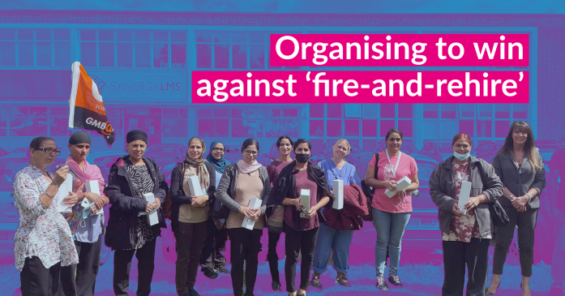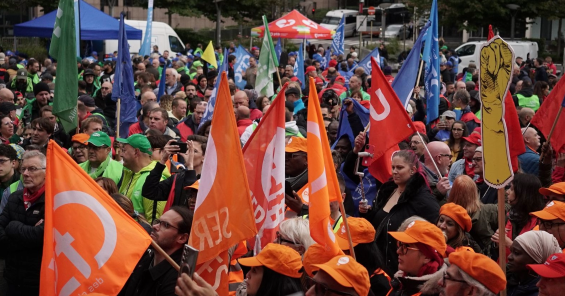A fresh win for workers and their union GMB provides key insight into how organising can successfully halt employer offensives. Workers at a commercial laundry company in Derby (United Kingdom) beat back the threat of ‘fire-and-rehire’ and have come out of the conflict stronger than ever, giving themselves the tools to get an ever-fairer share of the wealth they create.
‘Fire-and-rehire’ has been spreading across the UK in recent years as employers have been empowered to force mass resignations of their staff only to offer them the same jobs on worse conditions. This malpractice is particularly rampant in the care sector supply chain. Workers at Synergy LMS, a commercial laundry company providing linen for hospitals in the East Midlands, were informed by local management that they had 90 days to resign and accept worse conditions on new employment contracts. The workers had other plans.
Since early 2021, UNI Europa’s EPOC has been working with GMB organisers in the Midlands and East Coast region to build capacity, particularly in the care sector. This includes care homes but also the supply chain in the care sector, where this campaign was recently concluded. We take a look at key elements of the successful organising campaign.
Rooting the campaign in workers’ everyday issues
‘Fire-and-rehire’ is making the headlines in the UK as a huge threat to workers. However, it is not this broader context which drove the workers to collective action but rather first-hand problems experienced on the shop floor. Through repeated one-to-one conversations during site visits at shift change, the organiser was able to identify that the elimination of overtime supplement and management bullying were hot issues of contention among the workers.
Approximately 210 people operate Derby’s Synergy LMS plant, one of the NHS’ outsourced laundry facilities. These essential workers are from various (mostly) minority communities. The local management was using this diversity to divide the workers through discriminatory treatment on leave approval as well as in terms of the demeaning treatment certain categories of workers were made to endure.
Key to the success of the campaign was identifying the issues that united workers, rather than framing the campaign around the vocabulary of the union’s political priorities. While ‘fire-and-rehire’ was a vehicle the employer was attempting to use to drive down conditions, it was the specifics of the conditions themselves that workers were drawn in by. This included bullying, which was not an issue specifically affected by the fire-and-rehire attempt but which contributed to the simmering resentment which could also be addressed through collective action.
Building on existing networks
While the differences between workers had been used by the local management to discriminate, the tight-knit communities of those workers proved to be a strength when a robust organising approach was introduced to the workplace. When workers from the respective communities came together, they were able to make use of their everyday informal networks of trust to rapidly coordinate and dramatically increase action readiness.
As Midlands & East Coast GMB organiser Mick Coppin explained: “once you find the right leaders in the workplace, it’s all about developing them.” As well as covering the respective communities, a number of factors were key to finding the right leaders: they had to cover different teams on the production line and be in touch with different shift crews. The number of union reps was expanded from one to three, with people who maximised coverage, while the network of informal coordinators went well beyond to ensure full coverage.
Resourcing those workers meant providing the union’s knowledge and experience to inform and guide their strategy as well as providing material support for collective action. The workers’ ownership and commitment to winning was illustrated when they got together outside of work to make their own handmade multilingual campaign banners.
Identifying key points of workers’ power
Another key to making the employer think again was identifying the points of structural power that the workers could exploit in order to make the employer listen. There have been very few victories for unions in the UK on fire-and-rehire cases, while there have been several long and drawn out strikes, which both workers and the union wanted to avoid. In this company, two points of worker power really stood out: a production bottleneck, or choke point, and a leverage angle based on the wider company’s growth strategy.
The production choke point was identified by analysing the production process. It turned out that the work of the small team of haulers was a bottleneck on the production line. By stopping work, they cut the supply of laundry and the cleaning process was rapidly brought to a standstill. When the day came to down tools, their participation was key as it jammed the production chain for all workers who then naturally joined the action.
Another key point of leverage was the company’s most important client: the publicly owned National Health Service. Here, the communications work came into play and had two aims: expose the bad management practices to the client highlighting risks associated with a breakdown of labour relations; build political pressure to impact future decisions on the NHS’ outsourcing practices. The dispute’s profile was amplified when national and local politicians came down to meet the workers on the picket line to show their support.
Lasting wins
After months of impressive groundwork, the workers and their GMB union won. The CEO agreed to withdraw the fire-and-rehire threat and local management was replaced to end the bullying. Not content with resting on their laurels, the workers are already in the process of negotiating a new leave allowance policy (it was abuses around leave authorisation that had been a major catalyst for the campaign in the first place).
Beyond the immediate wins, the workers now have the experience and the collective confidence to ensure lasting respect at work. Union membership doubled to an overwhelming majority of the workforce. The structures are now in place to ensure workers have a say over future decisions that shape their working lives. It is yet another example of how reinforcing workplace and company structures is a core part of building sustainable collective bargaining power.
This organising effort can provide inspiration to trade unionists in the UK and beyond. It shows that fire-and-rehire can be beaten back and holds key lessons to all those facing off offensive employer campaigns.
The EPOC programme brings together unions from across northern and western Europe to organise in a coordinated and effective way by building workers’ power. Its remit is to defend, extend and (re)build collective bargaining by providing support to affiliates in building sustainable structures. Online meetings of the network take place monthly. If your union is interested in getting involved in EPOC, contact Erkan Ersoy or Ben Egan for more information.
Find out more:
WATCH: GMB members won big at Synergy LMS in Derby and stopped fire re-hire ⬇
We can unite & fight fire & rehire, it’s time politicians saw it for what it is and made it illegal.
We’re always campaigning & fighting for members. Get the GMB on your side today. pic.twitter.com/1gNtlFJ9xL
— GMB Midland & East Coast (@GMBMIDLAND) August 11, 2021


